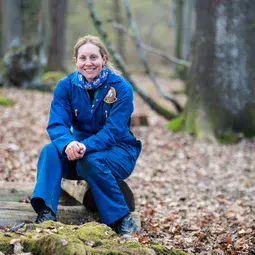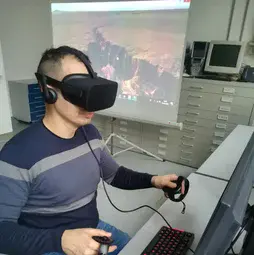EGU 2018 Public Engagement Grants awarded to Suzanne Imber and Fabio Bonali
13 April 2018
The EGU Outreach Committee has named Suzanne Imber and Fabio Bonali as the winners of this year’s EGU Public Engagement Grants competition. The €1000 grants are awarded to EGU members interested in developing an outreach project to raise awareness of the geosciences outside the scientific community. Imber will use the funds to engage school kids in the UK and inspire them to study science, especially space science. Bonali will use the grant to help Italian students with motor disabilities explore geological sites in virtual reality.
Suzanne Imber is an associate professor at the University of Leicester in the UK who won the BBC show ‘Astronauts: Do you have what it takes’ in 2017. The show gave Imber a “remarkable and unique platform for outreach and public engagement,” she explains in her proposal, and has since allowed her to engage over 17,000 children over a period of four months. With a number of other talks and exhibits lined up at science fairs, school outreach events, festivals and other science celebrations, Imber will use the EGU Public Engagement Grant to build and buy equipment that can be used at the events to more effectively engage children with space and planetary sciences. The equipment includes a programmable Mars Rover, a Lego BepiColombo spacecraft and virtual reality goggles that use software that allows users to explore the surface of Mars.
Fabio Luca Bonali is a post-doc researcher at the Department of Earth and Environmental Sciences (DISAT) at the University of Milano-Bicocca who co-founded the outreach organisation GeoSocial Science & Media. During an Open Day event at his department in February this year, he guided high school students in a 3D virtual exploration of Italy’s active volcanoes. He now wants to take this concept further with the support of an EGU Public Engagement Grant, helping high-school and first-year university students with motor disabilities engage with the Earth sciences. “Courses in Earth science degree programmes often imply fieldwork-based classes and this discourages the participation of people with different levels of motor disability,” he explains. His project “is designed to give physically disabled students a chance to explore geological-relevant sites by way of virtual and augmented reality.”
The grants are for a period of 12 months and will be awarded this month. The winners will receive 1000 euros each to develop their projects, and are invited to present their public-engagement work at the EGU 2019 General Assembly.
Contact
Bárbara Ferreira
EGU Media and Communications Manager
Munich, Germany
Phone +49-89-2180-6703
Email media@egu.eu


